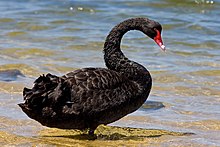
The black swan theory or theory of black swan events is a metaphor that describes an event that comes as a surprise, has a major effect, and is often inappropriately rationalized after the fact with the benefit of hindsight. The term is based on a Latin expression which presumed that black swans did not exist. The expression was used until around 1697 when Dutch mariners saw them in Australia. After this, the term was reinterpreted to mean an unforeseen and consequential event.[1]
The theory was developed by Nassim Nicholas Taleb, starting in 2001, to explain:
- The disproportionate role of high-profile, hard-to-predict, and rare events that are beyond the realm of normal expectations in history, science, finance, and technology.
- The non-computability of the probability of consequential rare events using scientific methods (owing to the very nature of small probabilities).
- The psychological biases that blind people, both individually and collectively, to uncertainty and to the substantial role of rare events in historical affairs.
Taleb's "black swan theory" (which differs from the earlier philosophical versions of the problem) refers only to statistically unexpected events of large magnitude and consequence and their dominant role in history. Such events, considered extreme outliers, collectively play vastly larger roles than regular occurrences.[2]: xxi More technically, in the scientific monograph "Silent Risk",[3] Taleb mathematically defines the black swan problem as "stemming from the use of degenerate metaprobability".[3]
- ^ Cite error: The named reference
Haworthwas invoked but never defined (see the help page). - ^ Taleb, Nassim Nicholas (2010) [2007]. The Black Swan: The Impact of the Highly Improbable (2nd ed.). London: Penguin. ISBN 978-0-14103459-1. Retrieved 25 April 2020.
- ^ a b Taleb, Nassim Nicholas (2015), Doing Statistics Under Fat Tails: The Program, retrieved 20 January 2016